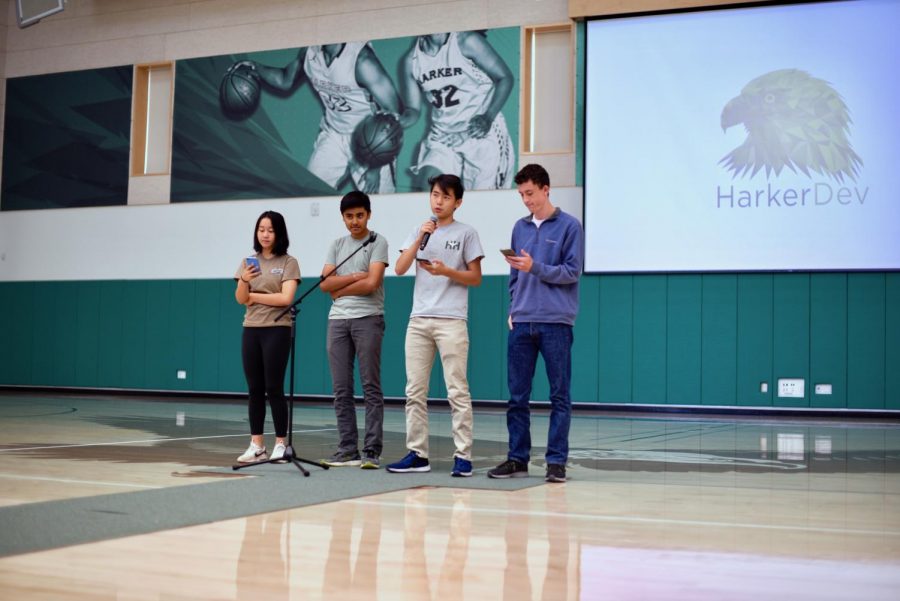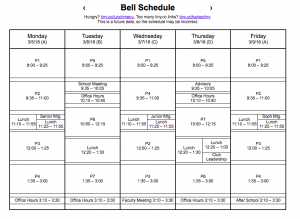HarkerDev heads towards future
Innovation marks the group behind bell schedule, HarkerPay
The four Harker Dev admins, Gloria Zhu (10), Chirag Kaushik (10), Ben- nett Liu (12) and John Lynch (11), give an announcement at school meeting. They presented their new developments, including a platform to streamline announcements.
December 7, 2019
Standing behind the microphone in front of the student body and faculty, Bennett Liu (12), John Lynch (11), Gloria Zhu (10) and Chirag Kaushik (10), the four admins of the upper school’s software development organization HarkerDev, preview applications coming soon to the upper school, like an app to streamline announcement submissions for school meetings. On top of that, Dev will be releasing both volunteering and college counseling drop-in platforms in the near future.
Behind these applications is a tight-knit group of 10 sophomores, juniors and seniors who decided to join for various reasons.
“[Computer science] was a field that was really interesting to me, which is why I decided to join. I still think it suits my interests really closely,” member Bowen Yin (11) said. “Going through the process of making the whole app and then being able to release it and have lots of people use, I think that’s really satisfying knowing that the things that you’re making actually help people on a daily basis.”
Unlike most student organizations at Harker, Dev doesn’t have weekly meetings or officers with different jobs. There are only two positions: members and admins, and most communication between sub-teams for each project occurs over chat or video calls. However, that hasn’t prevented the group from bonding over the years.
“We all get along in a way. We don’t have a president of sorts. We’ll have admins but it’s nice where there’s that dynamic where everyone’s friends and so it’s not really a high-stress environment,” John said.
In addition to the several upcoming projects, Dev has already put out many applications with which the upper school community interacts daily. One of Dev’s first projects was a course planner; after came bell schedule, Dev’s most popular app to-date which displays updated schedules and class times. HarkerPay, used mostly by student vendors, allows students to charge purchases directly to their student account, dismissing the need for carrying easily-stolen cash.
While each project differs from the next, after Dev either receives or pitches an idea, they create a proposal outlining the frameworks to be used, features of the app, target audience, purpose and demand. From there, Dev communicates with administration, who then refers them to the appropriate contact point for necessary resources. If there is a high enough demand for the application, then Dev assigns a project leader and 3-4 people begin working on the code; from that point to the project’s finish can be anywhere from six months to a year.
“Our workload is pretty variable. It can depend on what stage you are in the project and what stage you are in the year and your other commitments,” Gloria said. “So some weeks you might work zero hours and then some weeks you might work 11, 12 hours.”
Some of that time also goes to re-working current apps, like keeping bell schedule updated with changes. Because of Dev’s increasing prominence as a web development organization, future projects will be going through a more rigorous process unlike any other Dev has had in the past.
“The more extensive projects such as HarkerPay and the ones that have a web presence, those are actually going to require an outside evaluator to come in who specializes in security to go through and look at their code and do a code walk-through to make sure it doesn’t have any web security holes that can be easily compromised,” said HarkerDev adviser Dr. Nelson, whose job entails reviewing project proposals and determining whether or not to continue with those projects.
When it comes down to it, in addition to being an advanced group of strong programmers, Dev is also an organization dedicated to the Harker community and to its members.
“Dev serves two purposes. The outward-facing one is to create a bunch of stuff to help people, but the inner one is also just to learn while you’re doing it, to get a feel, work on projects, have fun, and that’s for the members,” Bennett said. “We try to get projects that serve the broader community as well as things where we can learn to develop and learn to work more in a team and gain skills as we go. It’s both a learning opportunity and a service opportunity.”
This piece was originally published in the pages of The Winged Post on November 18, 2019.


















![“[Building nerf blasters] became this outlet of creativity for me that hasn't been matched by anything else. The process [of] making a build complete to your desire is such a painstakingly difficult process, but I've had to learn from [the skills needed from] soldering to proper painting. There's so many different options for everything, if you think about it, it exists. The best part is [that] if it doesn't exist, you can build it yourself," Ishaan Parate said.](https://harkeraquila.com/wp-content/uploads/2022/08/DSC_8149-900x604.jpg)




![“When I came into high school, I was ready to be a follower. But DECA was a game changer for me. It helped me overcome my fear of public speaking, and it's played such a major role in who I've become today. To be able to successfully lead a chapter of 150 students, an officer team and be one of the upperclassmen I once really admired is something I'm [really] proud of,” Anvitha Tummala ('21) said.](https://harkeraquila.com/wp-content/uploads/2021/07/Screen-Shot-2021-07-25-at-9.50.05-AM-900x594.png)







![“I think getting up in the morning and having a sense of purpose [is exciting]. I think without a certain amount of drive, life is kind of obsolete and mundane, and I think having that every single day is what makes each day unique and kind of makes life exciting,” Neymika Jain (12) said.](https://harkeraquila.com/wp-content/uploads/2017/06/Screen-Shot-2017-06-03-at-4.54.16-PM.png)








![“My slogan is ‘slow feet, don’t eat, and I’m hungry.’ You need to run fast to get where you are–you aren't going to get those championships if you aren't fast,” Angel Cervantes (12) said. “I want to do well in school on my tests and in track and win championships for my team. I live by that, [and] I can do that anywhere: in the classroom or on the field.”](https://harkeraquila.com/wp-content/uploads/2018/06/DSC5146-900x601.jpg)
![“[Volleyball has] taught me how to fall correctly, and another thing it taught is that you don’t have to be the best at something to be good at it. If you just hit the ball in a smart way, then it still scores points and you’re good at it. You could be a background player and still make a much bigger impact on the team than you would think,” Anya Gert (’20) said.](https://harkeraquila.com/wp-content/uploads/2020/06/AnnaGert_JinTuan_HoHPhotoEdited-600x900.jpeg)

![“I'm not nearly there yet, but [my confidence has] definitely been getting better since I was pretty shy and timid coming into Harker my freshman year. I know that there's a lot of people that are really confident in what they do, and I really admire them. Everyone's so driven and that has really pushed me to kind of try to find my own place in high school and be more confident,” Alyssa Huang (’20) said.](https://harkeraquila.com/wp-content/uploads/2020/06/AlyssaHuang_EmilyChen_HoHPhoto-900x749.jpeg)














